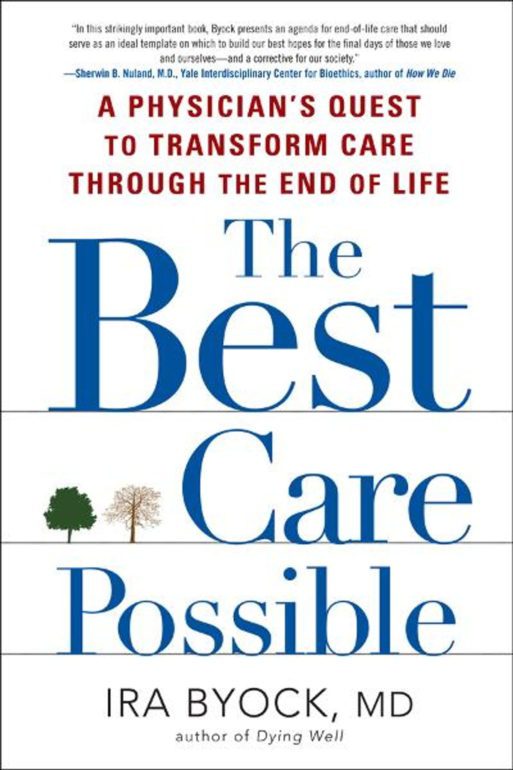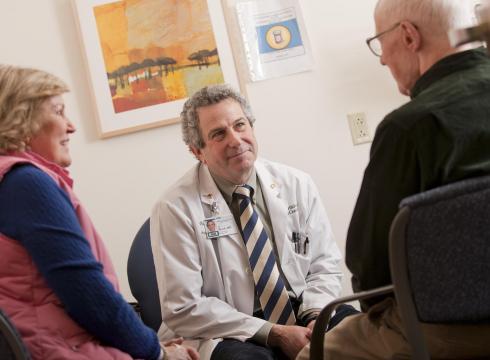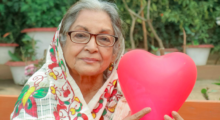 The Best Care Possible: A Physician’s Quest to Transform Care Through the End of Life is author and doctor Ira Byock, M.D.’s latest opus on end-of-life care. The palliative care physician’s reflections on being a “doctor to the dying” are an expression of hope, filled with real-life stories of love and strength in the face of impending loss – but they’re also an urgent call to action for medical reform.
The Best Care Possible: A Physician’s Quest to Transform Care Through the End of Life is author and doctor Ira Byock, M.D.’s latest opus on end-of-life care. The palliative care physician’s reflections on being a “doctor to the dying” are an expression of hope, filled with real-life stories of love and strength in the face of impending loss – but they’re also an urgent call to action for medical reform.
Reform for Ira Byock means better doctor-patient/family relationships; it means changing the way we educate our medical students on “topics related to dying, caregiving, and grief.” And perhaps most importantly – and this is perhaps the book’s most sensitive topic – it means learning to help patients die at the right time for them.
“When I was growing up in the 1950s and 1960s, if a doctor said, “Your father is dying,” it was like nature itself had spoken,” says Byock,“The doctor was not communicating a decision or even an opinion, he was simply stating a fact, making plain something that, from his technical expertise, he knew to be true.”
“When I was growing up in the 1950s and 1960s, if a doctor said, “Your father is dying,” it was like nature itself had spoken…”
— Ira Byock, The Best Care Possible
It is an era of medicine, he says, that holds no nostalgia for him.
Health care has become, comparatively, much more personal and specialized. Nevertheless, says Byock, there is still a lot of work to be done. Hyper-specialization has, in many ways, fragmented medical care. Palliative care, which provides pain relief for people with (often) life-threatening illnesses, is given the brush-off at many medical schools – most students are lucky to find it as the subject of an elective course.
“Hyper-specialization has, in many ways, fragmented medical care.”
Palliative care is not exclusively for those who are dying, but proves invaluable for those who are by approaching end-of-life conversations on a medical, professional and most importantly, personal basis. Doctor-patient/family relationships run much deeper today than they used to in the ‘50s, with physicians like Byock understanding that “the fundamental nature of illness is not medical; it is personal.”
When a doctor says a patient must run tests as soon as possible, he is also inadvertently bringing their personal life to a screeching halt. Physicians need to take the time – and receive the training – to utilize a careful blend of empathy and professionalism in their communication with patients. “If I am to serve them well, I need to read and be responsive to their reactions – their readiness, reluctance, respite,” Byock says. A patient may be the one receiving a diagnosis, but it’s his or her family that, in Byock’s words, receives the illness. No man is an island on his death bed – or, if he is, Byock encourages patients to reach out to those they are estranged from by exchanging four simple sentiments: Please forgive me. I forgive you. Thank you. I love you.
“No man is an island on his death bed – or, if he is, Byock encourages patients to reach out to those they are estranged from by exchanging four simple sentiments: Please forgive me. I forgive you. Thank you. I love you.”
The Best Care Possible: A Physician’s Quest to Transform Care Through the End of Life is not just a moving read, but one integral to the movement of making medical care for the dying as personal as possible. Byock reminds us that above all, families and physicians have to help patients die gracefully, with dignity. Extending a patient’s life through complicated and costly operations can keep them alive longer – but is that exhaustive route really improving the quality of their life? Or is it fighting the possibility to embrace the dying process?
Reading Byock’s internal questions and conflicts on this subject proves invaluable for those of us on the patient side of the fence. The Best Care Possible is a rare, cathartic experience that offers skeptical readers an opportunity to humanize medicine, which often runs the risk of becoming an impersonal enemy.
Related SevenPonds Articles:
- How Can We Raise Awareness About Palliative Care? An Interview with Helen McNeal
- Bringing Palliative Care into the Conversation
- Trends in Palliative Care

 “The Best Care Possible: A Physician’s Quest to Transform Care Through the End of Life” by Ira Byock, M.D.
“The Best Care Possible: A Physician’s Quest to Transform Care Through the End of Life” by Ira Byock, M.D.



 The Healing Sound of Singing Bowls
The Healing Sound of Singing Bowls
 “Summons” by Aurora Levins Morales
“Summons” by Aurora Levins Morales
 How To Dispose of a Body In Space
How To Dispose of a Body In Space














